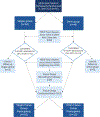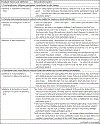"Food Doesn't Have Power Over Me Anymore!" Self-Efficacy as a Driver for Dietary Adherence Among African American Adults Participating in Plant-Based and Meat-Reduced Dietary Interventions: A Qualitative Study
- PMID: 34728414
- PMCID: PMC10278088
- DOI: 10.1016/j.jand.2021.10.023
"Food Doesn't Have Power Over Me Anymore!" Self-Efficacy as a Driver for Dietary Adherence Among African American Adults Participating in Plant-Based and Meat-Reduced Dietary Interventions: A Qualitative Study
Abstract
Background: African American (AA) adults are disproportionately affected by cardiovascular disease risk factors. Many nutrition interventions aim to promote healthier eating to reduce cardiovascular disease incidences among participants. However, little is known about what influences individuals' nutrition self-efficacy while participating in these interventions.
Objective: The objective of this study is to explore the drivers and barriers of nutrition self-efficacy among Nutritious Eating With Soul (NEW Soul) participants. The NEW Soul study was funded from the National Heart, Lung, and Blood Institute.
Design: A purposive-current study sampling was used to conduct 4 audio-recorded focus groups for this qualitative study. Bandura's self-efficacy theory of behavior change guided the framework. This theory asserts that individual self-efficacy is influenced by 4 factors: (1) mastery experiences, (2) vicarious experiences, (3) social persuasion, and (4) somatic and emotional states.
Participants/setting: Inclusion criteria for the NEW Soul program included being an AA, being between 18 and 65 years old, and having a body mass index between 25 and 49.9. Participants in cohort 2 (n = 84) of the NEW Soul program were asked to participate in focus groups. In total, 28 individuals (16 vegan, 12 omnivorous participants) took part in 4 in-person focus groups, which contained 3 to 13 participants. Focus groups took place in the southeastern United States.
Main outcome measure: Perception of drivers and barriers of following the diet.
Statistical analysis: Responses were analyzed qualitatively using principles of content analysis.
Results: Nine themes influenced participants' confidence in their ability to follow their diet: food preference, planning and preparation, identity and tradition, mindfulness, representation, social support, social influence, accountability, and state of mind.
Conclusion: In this study, self-efficacy played a prominent role in participants' motivations toward following the diet. Mastery experiences, vicarious experiences, social persuasion, and positive psychological arousal were all common themes in participant-reported sources of motivation. Nutrition interventions are likely to elicit positive behavioral outcomes if these 4 factors that enhance self-efficacy are incorporated into program development.
Keywords: African American; Community engagement; Nutrition self-efficacy; Qualitative research; Vegan diet.
Copyright © 2022 Academy of Nutrition and Dietetics. Published by Elsevier Inc. All rights reserved.
Conflict of interest statement
STATEMENT OF POTENTIAL CONFLICT OF INTEREST
No potential conflict of interest was reported by the authors.
Figures






References
-
- Hales CM, Carrol MD, Fryar CD, Ogden CL. Prevalence of obesity and severe obesity among adults: United States, 2017e2018. NCHS Data Brief No. 360, February 2020. Centers for Disease Control and Prevention. Published February 27, 2020. Accessed February 5, 2021, http://www.cdc.gov/nchs/products/databriefs/db360.htm - PubMed
-
- Centers for Disease Control and Prevention. Health of Black or African American population. FastStats. Published January 12, 2021. Accessed February 5, 2021, https://www.cdc.gov/nchs/fastats/blackhealth.htm
-
- Howard G, Howard VJ. Twenty years of progress toward understanding the stroke belt. Stroke. 2020;51(3):742–750. - PubMed
-
- Centers for Disease Control and Prevention. Adult obesity prevalence maps. Published 2021. Accessed September 15, 2021, https://www.cdc.gov/obesity/data/prevalence-maps.html.
-
- Poe T The origins of soul food in black Urban Identity: Chicago, 1915e1947. Am Stud Int. 1999;37(1):4–33.
Publication types
MeSH terms
Grants and funding
LinkOut - more resources
Full Text Sources

